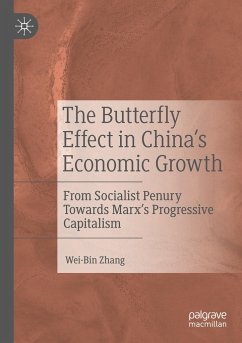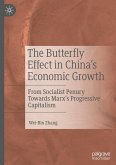This book examines the butterfly effect in China's modern economic development during the period of 1978-2018. In chaos theory, the butterfly effect refers to a phenomenon that a butterfly flaps its wings in Okinawa, and subsequently a storm may ravage New York. Deng applied a trivial idea, called the market mechanism, to China's countryside in 1978. The idea has subsequently caused economic structural changes and fast growth in the economy with the largest population in human history. China's per capita GDP jumped from $100 in 1978 to over US$8,000 in 2018. Eight hundred million people have made a great escape from poverty. By 2018, China was the world's second-largest economy from its 10th position in 1978 with its 9 per cent average annual growth rate of GDP in the previous four decades. This illuminating book will be of value to economists, scholars of China, and historians.
Bitte wählen Sie Ihr Anliegen aus.
Rechnungen
Retourenschein anfordern
Bestellstatus
Storno








